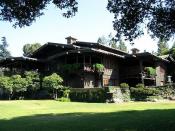A curious thing about gambling in America is that it is extremely popular, yet has a bad reputation--and I don't mean the unsavory way in which gambling licenses are awarded . I am talking about the moral realm, as witnessed in the clucking over William Bennett's expensive habit. Casinoland's high rollers are perceived as inhabiting a zone somewhere between immoral and diseased, and have great difficulty defending themselves. Yet in their own lives most Americans demand ever more gambling opportunities. As things stand now, legal gambling is available in all but three states (Hawaii, Tennessee and Utah), and most Americans admit to gambling sometimes. Surveys done in 1999 for the National Gambling Impact Study Commission told us that 86% of Americans had gambled at some time in their lives, and 68% had gambled within the prior year. Total legal wagering runs around $900 billion a year (about 10% of personal income), of which some $600 billion takes place at casinos.
Casinos, long confined to Nevada and New Jersey, now also exist in 27 other states (in 15 of which the business is open only to Indians). That $900 billion covers a broad range of activities, including lotteries, jai alai, pari-mutuel betting on horses and dogs, church and secular bingo, sports betting an more--yet it clearly understates the gambling total. It doesn't include illegal betting, whose total enormous but unknowable. And it doesn't include the gambling done in America's securities markets by day traders and others. Your broker can perhaps testify to running unto customers whose idea of investment is indistinguishable from Las Vegas action. In any event Wall Street offer plenty of bets with risk/reward opportunities that mirror those of slot machines--a long shot with the occasional huge payout. Buying out-of-the-money puts on an airline stock just before a union...



Gambling
Very good point. This essay is an easy read. Aside from a few grammatical errors, very well-writen and thought out.
4 out of 4 people found this comment useful.